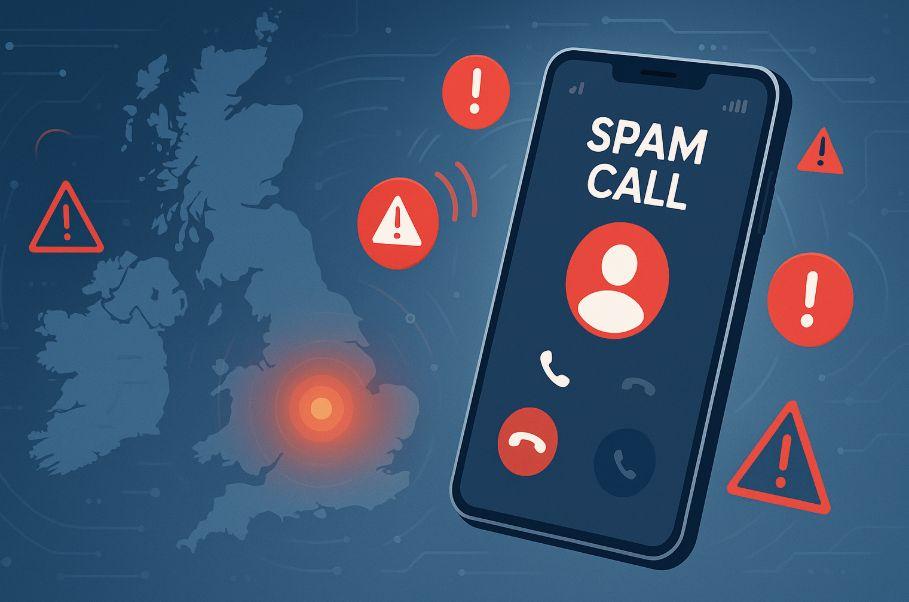Spam calls have become a growing menace across the UK, especially in major cities like London. These calls interrupt daily routines, cause anxiety, and in many cases, lead to financial fraud. With the rapid evolution of mobile technology and the globalisation of digital communication, the number of unsolicited calls has surged dramatically.
But why exactly are you receiving so many spam calls in the UK? Who is behind them, and most importantly, how can you stop them? This comprehensive guide aims to answer those questions by exploring the root causes of spam calls, identifying major players behind them, and offering reliable solutions to help you regain control of your phone.
Why Spam Calls Are Increasing in the UK?

Spam calls, also known as nuisance or unsolicited calls, are incoming phone calls from unknown or untrusted numbers that you haven’t opted to receive. These calls may promote products, push services, conduct surveys, or worse attempt fraud.
A Surge in Robocalling Systems
The technology behind these calls is often automated. Robocalling systems enable call centres to deliver pre-recorded messages or connect you to a live scammer. With just a few clicks, fraudsters can place thousands of calls per minute without any geographical limitations.
Cost Efficiency for Scammers
Compared to traditional scamming methods like email phishing or postal fraud, spam calls are cheap and quick. All a scammer needs is a VoIP platform and a phone number generator. These low barriers to entry have caused a boom in phone fraud across the UK.
Limited Global Regulation
One of the reasons spam calls are rising is the fragmented nature of telecommunications law. While Ofcom and the ICO enforce strong rules within the UK, calls originating from overseas often fall outside their jurisdiction, making enforcement extremely difficult.
Who Is Behind These Nuisance and Scam Calls?
There are typically two categories of entities behind spam calls: legitimate businesses and illegal fraud networks.
Legal Cold Calling Operations
Some spam calls come from legitimate UK-based companies offering products like insurance, energy plans, or telecom services. These are allowed if you haven’t opted out through services like the Telephone Preference Service (TPS). However, they’re still widely perceived as a nuisance.
International Scam Syndicates
A more troubling source is international scam networks operating from countries with weak enforcement. These networks are skilled in impersonating local UK numbers, tricking people into thinking the call is from a bank, NHS service, or government office.
They often use:
- Number spoofing: Making the caller ID appear local.
- Psychological tactics: Claiming urgent action is needed (e.g., “Your account has been compromised”).
- Social engineering: Gradually manipulating people to reveal sensitive data.
How Do Spam Callers Get UK Mobile Numbers?
Despite data protection laws like GDPR, scammers continue to find ways to access mobile numbers.
Online Forms and Marketing Funnels
Many individuals unknowingly share their personal information through online surveys, newsletter sign-ups, prize giveaways, or free downloads. These platforms often have hidden clauses that allow third parties to collect and distribute your data.
Data Leaks and Security Breaches
Hackers target e-commerce sites, mobile apps, and customer databases to steal personal information. When a leak occurs, your mobile number could end up on illicit databases sold on the dark web.
Mobile Apps with Excessive Permissions
Some free apps request access to your contacts, location, or even call logs. This data is often monetised and, in some cases, sold to advertisers or third-party analytics companies, making your number vulnerable to spam.
Why Are London Residents Targeted More Frequently?

London, as the capital and economic heart of the UK, experiences a disproportionately high number of spam calls.
High-Income Demographic
Many scams are financially motivated. Fraudsters prioritise areas with higher average incomes, knowing they’re more likely to engage with bank customers, investors, or homeowners all ideal targets for financial fraud.
Population Density
More people equals more phone numbers. Scammers often use auto-diallers that target densely populated postcodes, increasing the odds of reaching someone who picks up.
Public Records and Business Listings
Professionals in London are often listed in business directories, LinkedIn profiles, or online job platforms providing scammers with easy access to contact details.
Are These Calls Dangerous or Just Annoying?
The impact of spam calls ranges from simple annoyance to serious financial loss.
Annoyance and Daily Disruption
Silent calls, surveys, and telemarketing messages are primarily irritating. They disrupt your focus, waste time, and clog your voicemail.
Financial Fraud and Identity Theft
More malicious spam calls aim to steal money or sensitive information. Callers might pose as your bank, utility company, or even HMRC, asking for payment or account confirmation. Victims have reported losing thousands of pounds after engaging with such fraudsters.
Emotional and Psychological Stress
For elderly individuals or those unfamiliar with scam tactics, these calls can be deeply distressing. Constant vigilance can lead to stress, paranoia, and fear of answering any call.
What Role Does Ofcom Play in Combating Spam Calls?
Ofcom plays a pivotal role in regulating communication services in the UK.
Regulatory Measures
Ofcom enforces strict rules on how UK businesses can use customer contact information. It mandates caller ID transparency, prevents number spoofing for local businesses, and prohibits calls to individuals registered with the TPS.
Investigation and Fines
Ofcom regularly collaborates with the Information Commissioner’s Office (ICO) to investigate illegal operations. In the past, companies have been fined up to £500,000 for breaching nuisance call regulations.
How Can You Stop Receiving So Many Spam Calls?

Install Trusted Call Blocking Apps
Several apps are designed to filter out nuisance and scam calls by cross-checking them against spam databases:
- Truecaller: Crowdsourced spam protection
- Hiya: Integrates directly with some UK networks
- RoboKiller: Uses answer bots to waste spammers’ time
Register with the TPS (Telephone Preference Service)
The TPS is a free service that legally prevents marketing companies from calling your number. You can register online at www.tpsonline.org.uk.
Contact Your Mobile Network
Most providers like O2, EE, and Vodafone offer spam-filtering services. You can request stronger filters, report spam numbers, or activate settings like “Silence Unknown Callers.”
What Should You Do If You Answer a Spam or Scam Call?
Stay Calm and Say Nothing
If you answer a suspicious call, do not confirm any details. Even simple replies like “Yes” or “Correct” can be used maliciously.
Hang Up Immediately
The best defence is disengagement. Scammers are trained to manipulate and confuse. Hanging up protects your personal information.
Report the Incident
You can report spam calls to:
- Ofcom
- Your mobile network
- Action Fraud UK
Can Mobile Providers in the UK Help Reduce Spam Calls?
Yes. Most UK providers now offer enhanced call-blocking services either by default or as an opt-in.
EE’s Call Protect
This service automatically blocks calls from numbers flagged as fraud or nuisance sources.
Vodafone’s Secure Net
Secure Net identifies harmful sites and blocks suspicious content, including spam calls.
O2’s Nuisance Call Reporting
O2 allows you to report numbers via SMS, contributing to a national spam database.
How Effective Are Phone Features Like ‘Silence Unknown Callers’?

Smartphones now come equipped with built-in features to combat spam.
Apple’s iOS Silence Unknown Callers
This option sends all unknown numbers to voicemail. While effective, it risks blocking important calls from delivery drivers, recruiters, or healthcare providers.
Android’s Spam Protection
Most Android phones (especially those running Google’s dialler app) now flag spam numbers and provide caller ID info.
What Are Some Legal Steps Being Taken Against Phone Scammers?
The UK government has recognised spam calls as a cyber threat and is taking legal action.
ICO Enforcement
The Information Commissioner’s Office has cracked down on companies violating privacy laws, issuing heavy fines and bans.
Cooperation with Telecoms
New rules require telecom companies to monitor traffic for scam patterns and alert users.
Global Partnerships
The UK is also working with international law enforcement through Europol and Interpol to trace and shut down scam call centres abroad.
What Are the Long-Term Solutions to the Spam Call Epidemic?
Investment in AI-Based Detection
AI can identify call patterns faster than humans. Telecom providers are investing in intelligent filtering systems to detect spam before it reaches your phone.
National Education Campaigns
Organisations like Age UK and Citizens Advice are leading awareness campaigns to educate vulnerable groups on scam tactics and safety.
Stronger Data Privacy Laws
Continued legislative updates to protect consumer data will limit scammers’ ability to obtain phone numbers in the first place.
Top Spam Call Blocking Apps in the UK
| App Name | Platform | Free Version | Premium Features | Effectiveness Rating | Extra Benefits |
|---|---|---|---|---|---|
| Truecaller | iOS/Android | Yes | Caller ID, spam blocking | Excellent | Community-reported spam filtering |
| Hiya | iOS/Android | Yes | Auto-block, spam alerts | Very Good | Works seamlessly with Samsung phones |
| RoboKiller | iOS/Android | No | Voice bots, number blacklisting | Very Good | Custom voicemail replies |
| Call Blocker | Android | Yes | Manual blocking | Moderate | Lightweight and efficient |
| Norton Mobile Security | iOS/Android | No | Antivirus + call blocking | Very Good | Full mobile security suite |
Conclusion
Spam calls are a complex and persistent issue in the UK, fuelled by low-cost technologies, international fraud networks, and data leaks. While it may not be possible to stop them entirely, Londoners and UK residents can take meaningful steps to protect themselves.
With call blocking tools, registration with the TPS, increased awareness, and support from Ofcom and mobile providers, you can significantly reduce your risk. By staying alert and informed, you can answer your phone with confidence once again.
FAQs
What is the difference between spam calls and scam calls?
Spam calls are unsolicited calls often for sales or marketing. Scam calls are fraudulent and attempt to steal your money or data.
Is it safe to answer calls from unknown UK numbers?
It’s best to avoid answering unknown calls. If important, they will usually leave a voicemail.
Why do I get spam calls even after blocking the number?
Scammers rotate and spoof numbers, so blocking one may not prevent future calls.
Are certain mobile networks in the UK more vulnerable?
Not particularly. All major UK providers offer similar spam protection services.
What is phone number spoofing and how does it affect me?
Spoofing disguises the real caller ID to make it look like a local or known number.
Can I sue for repeated nuisance calls in the UK?
Yes, especially if you are registered with the TPS and continue to receive marketing calls.
How can elderly people in London be protected from spam calls?
Provide them with call blockers, register their numbers with the TPS, and educate them on common scams.









Leave feedback about this